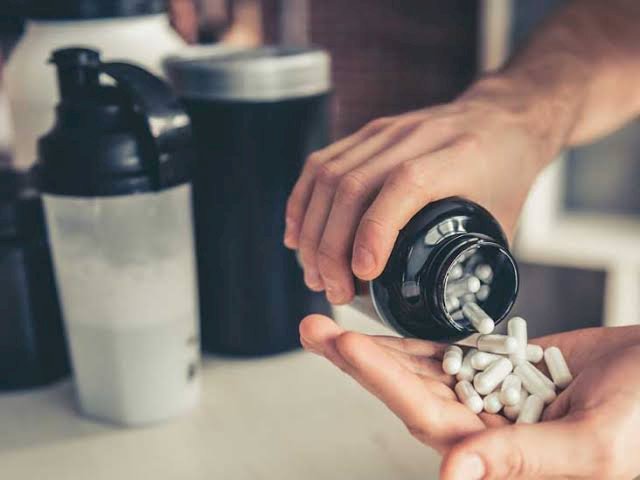Supplements And Muscle Growth, Do They Really Work?
A look into the world of muscle growth supplementation, what they are, what they do and if they actually do work.

When walking through the doors of your local nutrition supplement store or navigating to the nearest fitness website, you can easily be carried away by the wonderful world of muscle-building supplements. On display are giant cans and bottles of powders, liquids, and capsules featuring pictures of enormous biceps,abs you could practically do your laundry on, and butts as hard as concrete. Those muscular body parts look great, but the question is: do these muscle-building supplements actually help? Or do they just make for an expensive urine?
How Do These Muscle Building Supplements Work?
Muscle is created by an increase in the size or number of muscle fibers, which happens in response to loading and subsequently tearing and re-building the muscle. Most muscle building supplements are designed to either:
-
Allow a greater load to be placed on the muscle by increasing the ability of the muscle to produce a force; or
-
Increase a muscle’s ability to recover, re-build, and form new fibers.
NB - A muscle building supplement is not the same as a fat loss supplement, which is designed to increase the metabolism or decrease appetite craving.
The Role Of Protein
Protein is an important part of our diet and key to building and maintaining all types of body tissue, including muscle. It contains amino acids, the building blocks used for muscle growth. Protein powders, available as shakes, bars and capsules, are one of the most popular muscle-building supplements. They're legally available to buy over the counter as well as online.
They're marketed as helping to promote your body's muscle growth, aid metabolism (helping with weight loss), help you reach peak physical performance, boost energy and fight the ageing process.
"Users may choose to take them before, during and after training to enhance performance and improve recovery, add them to meals to boost their protein, or drink them between meals as a high-protein snack," says Azmina Govindji from the British Dietetic Association (BDA).
But they could get the same benefits from introducing high-protein foods to their diet as snacks or adding them to their normal meals to enhance the protein content.
Although protein shakes are convenient, not all of them are suitable to be used as a meal replacement, because they don't have all the vitamins and nutrients that a balanced meal would contain.
This means that bodybuilders and regular gym goers who turn to protein supplements, instead of simply eating protein rich foods, could be wasting their money. There's also evidence that, in the long term, consuming too much protein can lead to an increased risk of osteoporosis and can also worsen existing kidney problems.
The Department of Health advises adults to avoid consuming more than twice the recommended daily intake of protein (55.5g for men and 45g for women).
Protein Food Sources Include:
-
Red meat, such as beef, lamb and pork
-
Poultry, such as chicken, duck and turkey
-
Eggs
-
Dairy, such as milk, yoghurt and cheese
-
Beans
-
Tofu
What Has Science Got To Say?
Suzanne Smith, certified sports dietician at UC San Diego Health, says there is scientific evidence to suggest that some supplements can boost athletic performance. The products, however, should be selected based on proven safety and effectiveness.
“There’s a fair amount of research showing that supplements such as creatine can improve performance and muscle strength during high intensity, short interval exercise,” said Smith, who guides athletes on appropriate sport supplement use. “But before spending money on supplements, look at your diet. Dial in what you’re eating first.” Smith, who is part of a team of sports medicine experts, suggests that a simple balanced diet can be enough to give the needed boost. If you have a fridge full of protein rich foods, fruits and vegetables, you’re on the right track.
“That’s not to say that supplements don’t have a place in training. It depends on what kind of athlete you are. If you’re a weekend warrior, using supplements to get a few seconds of benefit may not be worth the cost,” said Smith. “There should be a specific reason for why you’re taking a supplement, such as improving recovery, speed and strength leading up to a competition. Be clear on your goals and set targets. Once you meet your target, get off the supplement. As training type and intensity change throughout year, so should your nutrition and use of supplements.”
Common among athletes is the use of pre- or post-workout supplements to aid muscle growth and recovery. The products are easy to acquire in nutrition stores or online. Among the most commonly used supplements are branched-chain amino acids (BCAA), creatine, beta-alanine and citrulline malate.
What Are They Exactly?
Branched-chain amino acids are nutrients that can be found in meat, dairy and legumes. They include leucine, isoleucine and valine and are known to improve performance and minimize protein and muscle breakdown during exercise.
“Branched-chain amino acids do have clear benefits for stimulating muscle growth and rebuilding,” said Smith. “But keep in mind that it’s still not clear if a BCAA supplement is more effective than whole proteins since whole proteins like whey protein contain enough BCAA. If you eat protein rich foods throughout the day, you may not need an additional supplement.”
The Most Popular CREATINE
Creatine is a compound found in food. It can also be made in the liver, pancreas and kidneys. Our bodies store the majority of creatine in muscle where it’s used to produce energy for short, high-intensity exercises, like sprints or weightlifting. Supplementing with creatine may increase stored levels in the muscle and provide more strength and power during workouts or competition. While creatine can promote muscle growth, some users complain of water weight gain, up to four pounds.
“Creatine really should be used when you plan on short, intense repetitive exercise,” said Smith. “Twenty to 30 percent of users are non-responders to the supplement. If you do try it, take the recommended dosage and pay attention to any added benefit. It’s possible your muscles have enough from food alone.”
Smith says that if you are healthy, with no pre-existing renal or liver conditions, research shows no adverse effects from these supplements but always check with your doctor if you have questions or if you are on prescription medication. Smith also warns users to consider the source of their supplements.
Ilegal Bodybuilding And Sports Supplements
UK drug regulator the Medicines and Healthcare products Regulatory Agency (MHRA) has warned people to be wary of buying illegal sports supplements, as they might contain dangerous ingredients that could cause kidney failure, seizures and heart problems.
An MHRA investigation found 84 illegal products, such as energy and "muscle-gain" products, were being sold containing dangerous ingredients such as steroids, stimulants and hormones.
David Carter, the MHRA's manager of the borderline medicines section, says: "People need to be aware that buying illegal sports supplements can seriously damage your health. "The products may claim to boost your energy or muscle, but they could contain unapproved ingredients that can cause kidney failure, heart problems or seizures."
Even legal supplements can cause you harm. For example, if you're taking any medicines as well as supplements, the supplements could stop the medicine working properly.
Risks Of Steroid Use
Although available with a doctor's prescription for a variety of clinical reasons, some steroids are misused when taken as performance-enhancing drugs. They're attractive because they're based on the male hormone testosterone and can therefore improve endurance and performance, and stimulate muscle growth.
But they can also enhance aggression, in reference to what is commonly called "roid rage". Other major effects of steroid use include increase in blood pressure, direct kidney and heart damage, liver damage, acne and sexual promiscuity.
Conclusion
Is using sports supplements worth it? depends on the how and why, if used for competition, aid recovery or enhance muscle growth all done within the right context, then its fine, albeit using the right supplements. If done illegally using the wrong products, it could lead to serious health complications and possibly death. Key note here is, you can get enough muscle building nutrients from everyday meals rich in protein and other food sources, go the healthy way instead, it's cheaper, healthier and can very much save your life.
What's Your Reaction?




















